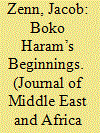|
|
|
Sort Order |
|
|
|
Items / Page
|
|
|
|
|
|
|
| Srl | Item |
| 1 |
ID:
190738


|
|
|
|
|
| Summary/Abstract |
This article centers on the Guantánamo detainee assessment of diaspora Nigerian jihadist in Saudi Arabia, Umran Bakr Muhammad Hausawi (Umran), which has never been cited previously in literature on Boko Haram. Through analyzing this detainee assessment alongside Boko Haram founding members’ interviews, al-Qaeda publications about Boko Haram’s founders, media reports contemporaneous with Boko Haram’s founding, US leaked and declassified intelligence documents about Nigeria during Boko Haram’s founding period, and Nigerian salafis’ firsthand accounts of Boko Haram’s founders, this study argues that diaspora Nigerians in Saudi Arabia introduced jihadism to Nigeria along with an Algerian jihadist operating in Nigeria in 1994. Moreover, Umran’s detainee assessment and corroborative sources demonstrate Saudi, US, and Nigerian intelligence officials monitored jihadists from Nigeria’s diaspora in Saudi Arabia before Boko Haram’s founding in 2002 and first confrontations with Nigerian security forces in 2003. This work also affirms that Boko Haram’s “originator,” Muhammed Ali, was a diaspora Nigerian jihadist in Saudi Arabia and received funding through Umran, Umran’s brother Umar, and Usama bin Laden’s Yemeni envoy, who all operated between Nigeria and Afghanistan before 9/11 on Bin Laden’s directives. Further, the jihadist from Nigeria’s diaspora in Saudi Arabia who succeeded the Yemeni envoy, Ibrahim Harun, knew Umran, Umar, and their other brother who joined al-Qaeda with Umar around 1995. This was eight years before Harun traveled from Pakistan to Nigeria on an al-Qaeda mission. This research supports the emerging literature that argues that studies of Boko Haram’s evolution from 2004 under Ali’s successor, Boko Haram “founder” Muhammed Yusuf, must consider the intense intelligence pressure that jihadists experienced in Nigeria after 1995, which Yusuf sought to avoid, and which affected Yusuf’s preaching and preparation for the jihad he eventually launched in 2009. The article further contributes to the literature on transnational, salafi-jihadist currents throughout the Muslim world and the Nigerian diaspora.
|
|
|
|
|
|
|
|
|
|
|
|
|
|
|
|
| 2 |
ID:
032294


|
|
|
|
|
| Publication |
London, Croom Helm Ltd, 1985.
|
| Description |
189p
|
| Standard Number |
0709935455
|
|
|
|
|
|
|
|
|
|
|
|
Copies: C:1/I:0,R:0,Q:0
Circulation
| Accession# | Call# | Current Location | Status | Policy | Location |
| 026340 | 330.9538053/MER 026340 | Main | Withdrawn | General | |
|
|
|
|
|
|
|
|
|